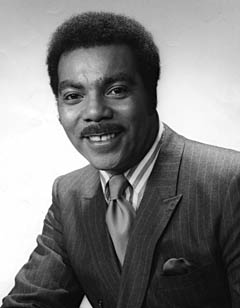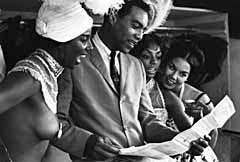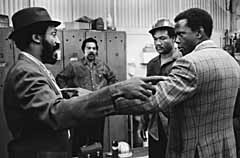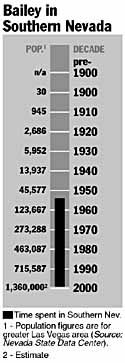Bob Bailey
Bob Bailey had been a star singer with the Count Basie Orchestra and had graduated from Morehouse College, one of the best traditionally-black schools in the United States. But when he got a job in broadcasting, he had to use the service entrance to reach TV studios in the Fremont Hotel.
"Flora Dungan was the accountant for Channel 13," remembered Bailey. "She was so outraged, when she learned they wouldn't let me in the front door, that she invited me for lunch. They kept us waiting and waiting, and finally they called her away from the table. Of course, that was to tell her they wouldn't serve her as long as she was with me."
Bailey met with Eddie Levinson, operator of the Fremont, asking for access to his work and maybe to a lunch counter once in a while. Levinson said he'd think about it. "I got impatient and went on the air and said if I was late getting onto the show some day, it would be because I had to come in the back way."
Levinson called his boss and raised hell about Bailey mentioning the Fremont's Jim Crow policy on the air. But eventually he relented, and for a while Bailey was the only black who could dine at the Fremont.
Nobody seemed to resent the exclusivity of his arrangement, said Bailey. "All the hired help was very proud that somebody had broken the color line. ... There's a saying, 'If you let one in, they'll all come.' Well, there's truth in that. Somebody has to start it."
Bailey has spent the rest of his life starting it, and helping others start it.
William H. Bailey was born Feb. 14, 1927, in Detroit, where his father worked in an auto factory. When his father lost his job during the Depression, the family moved to Cleveland, where Bailey grew up and learned to sing in church choirs.
The Bailey family has a strong musical tradition; vocal star Pearl Bailey was Bob's second cousin, and Pearl's brother, Bill, was a professional dancer and singer before her. Embarking on his own vocal career, William Bailey adopted the nickname "Bob" to avoid confusion with his cousin and with still another entertainer, who had inspired the jazz standard "Bill Bailey, Won't You Please Come Home?"
"I had a quartet called the Four Notes, and we won every amateur show in Cleveland," recalled Bailey. "We sang a little scat and a little do-wop. We fashioned ourselves pretty much after the Ink Spots. Either them or the Mills Brothers, everybody fashioned themselves after one or the other."
Bailey finished high school at 16, and his ambition was to be an international lawyer. He intended music to be his fallback profession. Combined with his high grades, it won him a voice scholarship to Morehouse in Atlanta. He was working his way through college by performing in a local night club when two white guys heard him and asked if he would be interested in singing with Count Basie.
"I thought they were queer or something," laughed Bailey. Basie was at the peak of a high-flying career and the idea that the offer might be anything but a trick simply did not occur. But the white guys turned out to be bandleader Benny Goodman and John Hammond, a wealthy patron of music and a silent sponsor of Count Basie.
On Christmas break Bailey auditioned with Basie himself and got hired. A senior with enough credits to take an early degree, he left at semester's end to become one of the band's two featured singers. His specialty was singing pop solos for dance engagements.
"We played two kinds of theaters. One was called the Chitlin' Circuit, in the black communities of big cities, but we also played a lot of RKO theaters, which were patronized by the general public. I got a lot of exposure there because I sang stuff like Danny Boy, the kind of things Sinatra and Perry Como did." He had three hit records: "Danny Boy," "The Worst Blues I Ever Had," and "Blue and Sentimental."
The job vanished in 1950, when Basie broke up his big band. "The war was over, boys were coming home, and a different kind of society was forming. Music reflected it. The one-nighters that were the bread and butter of big bands were becoming less frequent, so the economics forced Basie to downsize."
By then Bailey had become enchanted with the new medium of television and attended the School of Radio and Television in New York City. But he soon learned that while American Broadcasting Company was willing to award him a scholarship, giving him a job was another story. "I applied for all kinds of jobs," he recalled. After it became clear he wasn't going to get hired as on-air talent he tried for technical jobs, also without luck. He couldn't even get hired as a gofer.
Then somebody thought up the Moulin Rouge. In a Las Vegas that was still highly segregated, the Moulin Rouge casino and hotel would be open to all comers. Clarence Robinson was hired to build a show with black entertainers. Bailey was already working in one of Robinson's shows, and in 1955 Robinson brought Bailey to Las Vegas as co-producer and master of ceremonies.
The Moulin Rouge show was a hit, drawing a hip, interracial crowd, particularly after midnight. And that's one reason the Moulin Rouge closed in six months, Bailey believes.
It's a seedy secret of Las Vegas that chorus girls used to be required to hang around the casinos to keep high rollers interested. "I am not asserting that they were required to sleep with them," said Bailey, "but a girl might be asked to just hang out with some special customer, and all were required to stay around the casino for a specified time after the last show, to provide ambience."
Chorus girls, however, are entertainers first and ambience-providers only secondarily and reluctantly, said Bailey. "Entertainers congregate according to talent, not color. So they all wanted to see our show, and would come over and watch. And as the showgirls go, so go the players. The Moulin Rouge became the place to be after hours."
Strip hotels put up notices in dressing rooms that cast members who went to the Moulin Rouge would be fired.
The short gig with the Moulin Rouge, however, brought a long-sought break -- a role in TV. He had a 13-week contract to host a show sponsored by the Moulin Rouge. "I was in week seven when it closed. The show had attracted its own audience by then.
"Hank Greenspun owned KLAS television in those days and he said he liked that show and wanted it continued. That meant his ad people had to find sponsors, and in a short time they did." The show was the first produced, acted in and directed by African-American talent, and after KLAS -Channel 8 started pushing it to black businesses, the first sponsored by them.
The original program was a variety show, featuring interviews with entertainers who happened to be appearing in town. Later Bailey did a Sunday show recapping and commenting on the weeks' news.
"I had been to school for this yet could not get any kind of job in TV, anywhere in the country, then it falls into my hands in Las Vegas, the Mississippi of the West. And I'm not only in the door, but I'm doing my own show." To walk away would have been irresponsible.
So he clung to his foothold like a lifeline. In 1957 he moved on to KTNV-Channel 13, where he hosted a variety show, developed Las Vegas' first dance program for teens. He left TV for two years to manage his cousin Pearl's road show. He returned to Channel 8 in 1961 to host current events talk shows and movies.
From 1965 to 1971 Bailey was a newscaster and variety show host at Channel 13.
The importance of pioneering a way for blacks in television, said Bailey, was not that he did it but that somebody did it. "It is a proud thing to look at television and see somebody that looks like you," said Bailey. "It gave a certain pride to the African-American community, to see a black man interview celebrities, to be taken seriously."
Along the way he wrote editorials for the Las Vegas Voice, the local Afro-American newspaper, and a column for Greenspun's Las Vegas Sun.
A person with the high profile attending these jobs, said Bailey, was naturally recruited into social causes. In 1956, his second year in Las Vegas, he was appointed local chairman of the Urban Renewal Advisory Commission, and numerous other appointments followed. Bailey was a Republican, and is again, but he changed parties to work for gubernatorial candidate Grant Sawyer in 1958. "He indicated that if he were elected governor certain changes would be made. He struck me as a man you could believe."
The Legislature of 1961 established a commission to find out whether discrimination existed. It was the best tool for social change that Sawyer could get, so he appointed Bob Bailey its chairman.
"We did not have any money, but they did give us the power of subpoena, and that was enough to get to the information we needed," said Bailey. Sawyer negated the Legislature's budget strangulation by diverting enough money from his own executive budget to rent hearing rooms and record testimony.
"I probably signed more subpoenas than the Kefauver Commission," laughed Bailey. "We showed what was going on and used that as the basis of getting the Equal Rights Law that we have today. And even before we got the law, hotels started opening up. We were able to open a public dialogue about why there were no black bellmen, no desk clerks, no waiters -- no blacks in any jobs where you could make good tips. And their position was nobody is qualified, and it made them look ridiculous. We could say, 'Blacks have been waiting on white people and carrying their baggage a hundred years, and we're not qualified?` "
His investigation of job opportunities made him a natural choice to direct a federally encouraged Manpower Services program, which beginning in 1971 trained minorities in jobs traditionally reserved for whites.
He persuaded Al Benedict, a Stardust executive, to loan the program gambling tables, space to set them up, and some experienced people who could teach in a dealers' school. "Then I suggested, 'Instead of doing it all yourself, why don't you get some of your friends to help?' "
Benedict recruited lower and middle managers from other casinos as teachers. When dealers finished their training, they typically were hired right away at different casinos, including Caesars Palace, said Bailey. So integration of the profession was widespread immediately. "I think it would have spread much slower, except that the managers from all these different casinos had seen us in action," he explained. There were also training programs in radio and television jobs, and other fields. By Bailey's count, more than 1,000 jobs were opened to minorities in less than two years.
Bailey said he became a businessman, because deciding to stay in Las Vegas made it necessary. "Making a living in TV or radio in those days, in this small market, did not happen much." TV and radio personalities had to develop sidelines, usually capitalizing on their name recognition. Bailey became a real estate broker and developer.
In 1964 he opened a club at Miller and Lexington avenues in West Las Vegas, and named it "Sugar Hill," after the nickname of a classy Harlem neighborhood and after a musical comedy about life there.
"For anybody from back East, the name would intrigue them and they would want to go there," said Bailey. It became an after-hours hangout where Johnny Carson would drop in and play the drums, where Louis Armstrong would pull his own mouthpiece from his coat pocket, borrow the house-band trumpet, and blast out a solo that rang like a call from Gabriel. Sugar Hill worked for about 25 years, before the neighborhood became too tough.
About 1965 Bailey bought the riot-damaged West Owens Shopping Center and converted much of it to the Pan-Afro Auditorium. "At the time, the churches were the only place black people could congregate in large numbers; the hotels didn't want you. So I built this. It seated 5,000, and you could break it up into different segments. Had bands in like Sonny Charles and Ray Charles."
Bailey later established the Nevada Economic Development Co., which Bailey figures helped minority businesses get $300 million over 19 years.
"Some of that was loans, some was lines of credit," said Bailey. "Some of it was plugging into public projects that had federal funds; we saw that subcontractors were Hispanics or African Americans or Asians who had the ability, but would not have had the opportunity, but for laws establishing minority set-asides." Bailey's success led to a job in Washington as an associate director of the Minority Business Development Agency. Later, President Bush made him a deputy director, overseeing MBDA's $66 million national budget and helping report to Congress on its work. He was invited to stay in Washington when administrations changed, said Bailey, but he had grown homesick for Nevada.
Bailey has been married since 1951 to the former Anna L. Porter. Their son, John Robert Bailey, is an attorney with Lionel, Sawyer & Collins. Their daughter, Kimberly Ann Bailey-Tureaud is a minority business developer.
Nowadays he is concentrating on his New Ventures Inc., which has been awarded a contract to certify local businesses as qualified to participate in a new Small Business Administration program.
Proud as he is of civil rights laws he helped pass, Bailey believes that today, learning the ropes of business, the professions, and technology will do the most to improve the lives of minorities. "There are still people who don't necessarily want to go to church with me or eat at the same restaurant I do," said Bailey. "But if I know how to run their computers, they're going to hire me."
Part I: The Early Years
Part II: Resort Rising
Part III: A City In Full




















